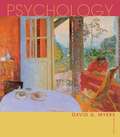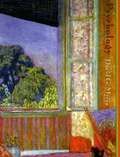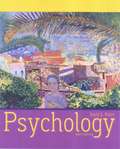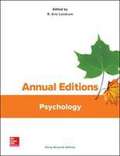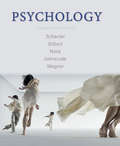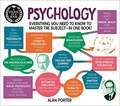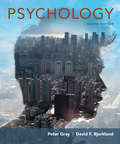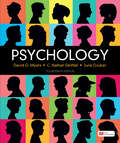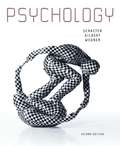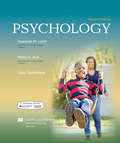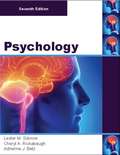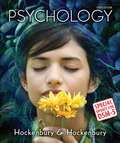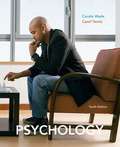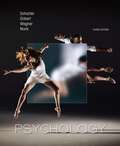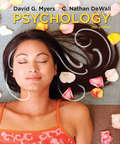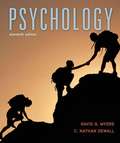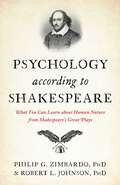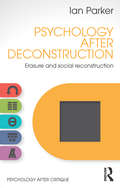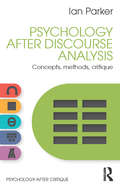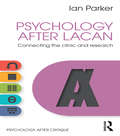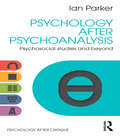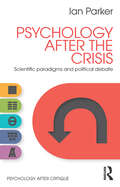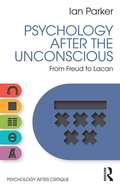- Table View
- List View
Psychology (7th Edition)
by David G. MyersThis new edition continues the story of psychology with added research and enhanced content from the most dynamic areas of the field--cognition, gender and diversity studies, neuroscience and more, while at the same time using the most effective teaching approaches and learning tools.
Psychology (8th edition)
by David G. MyersSwitching among several differing perspectives, this introductory textbook describes what scientific research has learned about the biology underlying human behavior and mental processes, changes during the life cycle, states of consciousness, learning and memory, intelligence, emotion, personality, and psychological disorders. The seventh edition adds a new section on motivation in the workplace, and a psychology timeline inside the hardcover. Annotation ©2004 Book News, Inc., Portland, OR (booknews.com)
Psychology (9th edition)
by David G. MyersSwitching among several differing perspectives, this introductory textbook describes what scientific research has learned about the biology underlying human behavior and mental processes, changes during the life cycle, states of consciousness, learning and memory, intelligence, emotion, personality, and psychological disorders. Annotation ©2004 Book News, Inc., Portland, OR (booknews.com)
Psychology (AP Edition)
by Philip G. Zimbardo Robert L. Johnson Ann L. Weber Craig W. GruberPsychology AP* Edition has been specifically designed to prepare you for the AP* Exam,with a close eye on content coverage and accuracy.
Psychology (Annual Editions)
by R. Eric LandrumThe Annual Editions series is designed to provide convenient, inexpensive access to a wide range of current articles from some of the most respected magazines, newspapers, and journals published today. Annual Editions are updated on a regular basis through a continuous monitoring of over 300 periodical sources. The articles selected are authored by prominent scholars, researchers, and commentators writing for a general audience. <p><p> Each Annual Editions volume has a number of features designed to make them especially valuable for classroom use: an annotated Table of Contents, a Topic Guide, an annotated listing of supporting websites, Learning Outcomes and a brief overview for each unit, and Critical Thinking questions at the end of each article. Go to the McGraw-Hill Create™ Annual Editions Article Collection at www.mcgrawhillcreate.com/annualeditions to browse the entire collection. Select individual Annual Editions articles to enhance your course, or access and select the entire Landrum: Annual Editions: Psychology, 47/e ExpressBook for an easy, pre-built teaching resource.
Psychology (Canadian Edition)
by Daniel M. Wegner Daniel L. Schacter Daniel T. Gilbert Matthew K. Nock Ingrid JohnsrudeThis widely used, enthusiastically received textbook is the work of one of the most accomplished author teams in introductory psychology, each a distinguished educator and researcher, and three of them (Schacter, Gilbert, and Wegner) authors of bestselling books for general readers. Together, they offer an approachable, engagingly written survey of the field's main ideas, filled with unusual stories, memorable examples, and lots of humor to captivate all kinds of students. And for this version, coauthor Ingrid Johnsrude from the University of Western Ontario again integrates a wealth of research and examples from Canada, giving Canadian students and instructors an introductory psychology textbook that is truly their own. Again carried by the authors' exceptional communication and teaching skills, the new edition has been retooled for the classroom chapter by chapter. Sections in each chapter now have specific Learning Outcomes in place, to emphasize "big picture" concepts and guide student learning. There is also new boxed feature called A World of Difference highlighting important research on diversity and individual differences, plus new Data Visualization Activities in LaunchPad, to help students build quantitative reasoning skills.
Psychology (Degree in a Book Series)
by Alan PorterThis book provides the reader with an overview of the different areas of psychology that are covered on a typical psychology degree course. Each chapter gives a general overview of the topic and introduces important concepts and research methods. In a series of boxes, important studies, individuals or methods are explored in greater depth. This will allow the reader to get a sense of the general ‘lie of the land’ and also a sense of the style of research carried out in different areas. At the end of the book, there is a section on further reading that provides a short, chapter-by-chapter, bibliography of books suitable for the general reader and textbooks targeted at psychology students.
Psychology (Evolutionary Psychology Ser.)
by Peter Gray David BjorklundPeter Grays evolutionary perspective and emphasis on critical thinking have made his rigorous yet accessible introduction to psychology a widely respected classroom favorite, edition after edition. Now thoroughly revised, with the help of new co-author David Bjorklund, Psychology, Eighth Edition, invites and stimulates students to investigate the big ideas in psychological science.
Psychology (High School Edition)
by David Myers C. Nathan DeWall June GruberThe number #1 bestselling intro to psychology in an exhaustively updated new edition.
Psychology (Second Edition)
by Daniel M. Wegner Daniel L. Schacter Daniel T. GilbertThoroughly revised and updated, the second edition of this popular introductory psychology textbook introduces effective new teaching techniques as well as a range of new topics. Clear and engaging, the book provides a fundamental insight into how the mind works.
Psychology (Second Edition)
by Deborah M. Licht Misty G. HullThoroughly revised with input and insight from many of the hundreds of adopters of the groundbreaking first edition, Scientific American: Psychology continues to set a new standard for the introduction to psychology. Deborah Licht and Misty Hull continue to combine their years of research and teaching insights with the journalistic skill of science writer Coco Ballantyne. Together, they have created an introductory psychology resource that combines print and digital components into a seamless learning experience. The project draws on written profiles and video interviews of 27 real people to help students better understand, remember, and relate to psychology’s basic ideas. Beautifully designed, the printed text is filled with high-interest examples and features, including full-page infographics that help students understand and retain key concepts. Online, additional author-created resources, including scaffolded activities and adaptive quizzes, provide a seamless learning experience for students and a reliable assessment mechanism for instructors and programs. This innovative collaboration between Worth Publishers and Scientific American reflects a commitment to engaging and educating all students, including those who sometimes seem difficult to engage—in the contemporary style of the world’s most respected science magazine.
Psychology (Seventh Edition)
by Lester M. Sdorow Cheryl A. Rickabaugh Adrienne J. Betz<p>If you have not adopted this book in the past, we believe that you will find that your students will be eager to read it and to learn from it. You will find that the book achieves interest and readability while also accomplishing the following goals: <p> <li>Portraying psychology as a science <li>Demonstrating the superiority of science over common sense <li>Showing that psychological research occurs in a sociocultural context <li>Illustrating the relevance of psychology to everyday life <li>Encouraging critical thinking in all aspects of life, particularly in regard to the media <li>Placing psychology in its intellectual, historical, biographical, and sociocultural contexts</li> </p>
Psychology (Seventh Edition)
by Don H. Hockenbury Sandra E. Hockenbury Susan A. NolanThis acclaimed classroom favorite makes the science of psychology (and through that, the process of science itself) come alive for students, with personal stories that exemplify important concepts in a student-friendly way, and with coverage of the field's scientific foundations and advances that is accessible without being oversimplified. <P><P>The substantially updated new edition extends the book's focus on developing scientific literacy in the context of psychology, with new features in print and in the book's new online course space, LaunchPad. These features are the result of the book's most dramatic addition: Sandra Hockenbury's new writing partnership with co-author, Susan Nolan, who shares her belief that the introductory course can help all kinds of students develop a real understanding of psychology and lasting scientific literacy without sacrificing the field's research core.
Psychology (Sixth Edition)
by Don H. Hockenbury Sandra E. HockenburyWelcome to psychology! Our names are Don and Sandy Hockenbury, and we're the authors of your textbook. Every semester we teach several sections of introductory psychology. We wrote this text to help you succeed in the class you are taking. Every aspect of this book has been carefully designed to help you get the most out of your introductory psychology course. Before you begin reading, you will find it well worth your time to take a few minutes to familiarize yourself with the special features and learning aids in this book.
Psychology (Tenth Edition)
by Carol Tavris Carole WadeThis text emphasizes the importance of critical thinking and the integration of culture and gender in the science of psychology and focuses on the development of critical thinking skills crucial to students' success in college and in later life.
Psychology (Third Edition)
by Daniel M. Wegner Daniel L. Schacter Daniel T. Gilbert Matthew K. NockStudents rarely look at a psychology textbook after leaving college, but they will continue to encounter psychology throughout their lives. With that in mind, renowned authors and researchers Schacter, Gilbert, Wegner, and now Matthew Nock introduce students to today's research with a focus on the critical thinking skills that will stay with them beyond the course term. Quirky examples of thinking gone awry, and scenarios based on common psychological misconceptions are just some of the tools the authors use to get students to question what they think they know about psychological science.
Psychology (Twelfth Edition)
by David G. Myers C. Nathan DewallDavid Myers' new partnership with coauthor C. Nathan DeWall matches two dedicated educators and scholars, each passionate about teaching psychological science through writing and interactive media. <P><P>With this new edition of the #1 bestselling Psychology, Myers and DeWall take full advantage of what an integrated text/media learning combination can do. New features move students from reading the chapter to actively learning online: How Would You Know puts students in the role of scientific researcher and includes tutorials on key research design principles; Assess Your Strengths self-tests help students learn a little more about themselves, and include tips about nurturing key strengths. <P><P>These and other innovations rest on the same foundations that have always distinguished a new David Myers edition--exhaustive updating (hundreds of new citations), captivating writing, and the merging of rigorous science with a broad human perspective that engages both the mind and heart. This edition of Psychology is accompanied by its own dedicated version of Worth Publishers' breakthrough online course space, featuring a fully integrated e-Book, LearningCurve adaptive quizzing, a rich collection of student media resources, and easy setup, assessment, and course management options for instructors. <P>What's in the LaunchPad
Psychology 11th Edition
by David G. Myers C. Nathan DewallDavid Myers' new partnership with coauthor C. Nathan DeWall matches two dedicated educators and scholars, each passionate about teaching psychological science through writing and interactive media. With this new edition of the #1 bestselling Psychology, Myers and DeWall take full advantage of what an integrated text/media learning combination can do. New features move students from reading the chapter to actively learning online: How Would You Know puts students in the role of scientific researcher and includes tutorials on key research design principles; Assess Your Strengths self-tests help students learn a little more about themselves, and include tips about nurturing key strengths. These and other innovations rest on the same foundations that have always distinguished a new David Myers edition--exhaustive updating (hundreds of new citations), captivating writing, and the merging of rigorous science with a broad human perspective that engages both the mind and heart. This edition of Psychology is accompanied by its own dedicated version of Worth Publishers' breakthrough online course space, featuring a fully integrated e-Book, LearningCurve adaptive quizzing, a rich collection of student media resources, and easy setup, assessment, and course management options for instructors. What's in the LaunchPad
Psychology According to Shakespeare: What You Can Learn about Human Nature from Shakespeare's Great Plays
by Philip G. Zimbardo Ph.D Robert L. Johnson Ph.DWilliam Shakespeare has undergone psychological analyses ever since Freud diagnosed Hamlet with an Oedipus complex. But now, two psychologists propose to turn the tables by telling how Shakespeare himself understood human behavior and the innermost workings of the human mind. Psychology According to Shakespeare: What You Can Learn About Human Nature From Shakespeare's Great Plays, is an interdisciplinary project that bridges psychological science and literature, bringing together for the first time in one volume, the breadth and depth of The Bard&’s knowledge of love, jealousy, dreams, betrayal, revenge, and the lust for power and position.Even today, there is no better depiction of a psychopath than Richard III, no more poignant portrayal of dementia than King Lear, nor a more unforgettable illustration of obsessive-compulsive disorder than Lady Macbeth&’s attempts to wash away the damned blood spot. What has not been revealed before, however, are the many different forms of mental illness The Bard described in terms that are now identifiable in the modern manual of disorders known as the DSM-5. But, as the book shows, the playwright&’s fascination with human nature extended far beyond mental disorders, ranging across the psychological spectrum, from brain anatomy to personality, cognition, emotion, perception, lifespan development, and states of consciousness. To illustrate, we have stories to tell involving astrology, potions, poisons, the four fluids called &“humors,&” anatomical dissections of freshly hanged criminals, and a mental hospital called Bedlam—all showing how his perspective was grounded in the medicine and culture of his time. Yet, Will Shakespeare&’s intellect, curiosity, and temperament allowed him to see other ideas and issues that would become important in psychological science centuries later. Many of these connections between Shakespeare and psychology lie scattered in books, articles, and web pages across the public domain, but they have never been brought together into a single volume. So, here the authors retell of his fashioning the felicitous phrase, nature-nurture for Prospero to utter in frustration with Caliban and of how the nature-nurture dichotomy would become central in psychology&’s quest to understand the tension between heredity and environment. But that was still far from all, for they discovered that his work anticipated multiple other psychological tensions. For example, in Measure for Measure, he made audiences puzzle over which exerts the greater influence on human behavior: internal traits or the external situation. And in Hamlet, he explored the equally enigmatic push-pull between reason and emotion in the mind of the dithering prince.Aside from bringing together The Bard&’s known psychology, the book is unique in several other respects. It reveals how his interest in mind and behavior ranged across the full spectrum of psychology, including topics that we now call biopsychology and neuroscience, social psychology, thinking and intelligence, motivation and emotion, and reason vs intuition. Further, we show how the psychological concepts he used have evolved over the intervening centuries—for example, the Elizabethan notion of sensus communis eventually became &“consciousness&” and the old idea of the humors morphed into our current understanding of hormones and neurotransmitters. We also note that some of Mr. Shakespeare&’s concerns seem especially timely today, as in the subplot of queer vs straight issues complicating the story of Troilus and Cressida and in Shylock&’s telling of prejudices inflicted on ethnic minorities.
Psychology After Deconstruction: Erasure and social reconstruction (Psychology After Critique)
by Ian ParkerIan Parker has been a leading light in the fields of critical and discursive psychology for over 25 years. The Psychology After Critique series brings together for the first time his most important papers. Each volume in the series has been prepared by Ian Parker, and presents a newly written introduction and focused overview of a key topic area. Psychology After Deconstruction is the second volume in the series and addresses three important questions: What is ‘deconstruction’ and how does it apply to psychology? How does deconstruction radicalize social constructionist approaches in psychology? What is the future for radical conceptual and empirical research? The book provides a clear account of deconstruction, and the different varieties of this approach at work inside and outside the discipline of psychology. In the opening chapters Parker describes the challenge to underlying assumptions of ‘neutrality’ or ‘objectivity’ within psychology that deconstruction poses, and its implications for three key concepts: humanism, interpretation and reflexivity. Subsequent chapters introduce several lines of debate, and discuss their relation to mainstream axioms such as ‘psychopathology’, ‘diagnosis’ and ‘psychotherapy’, and alternative approaches like qualitative research, humanistic psychology and discourse analysis. Together, the chapters in this book show how, via a process of ‘erasure’, deconstructive approaches question fundamental assumptions made about language and reality, the self and the social world. By demonstrating the application of deconstruction to different areas of psychology, it also seeks to provide a ‘social reconstruction’ of psychological research. Psychology After Deconstruction is essential reading for students and researchers in psychology, sociology, social anthropology and cultural studies, and for discourse analysts of different traditions. It will also introduce key ideas and debates within deconstruction to undergraduates and postgraduate students across the social sciences.
Psychology After Discourse Analysis: Concepts, methods, critique (Psychology After Critique)
by Ian ParkerIan Parker has been a leading light in the fields of critical and discursive psychology for over 25 years. The Psychology After Critique series brings together for the first time his most important papers. Each volume in the series has been prepared by Ian Parker and presents a newly written introduction and focused overview of a key topic area. Psychology After Discourse Analysis is the third volume in the series and addresses three central questions: How did discourse analysis develop inside psychology? How does discursive psychology address concerns about the traditional ‘laboratory experiment’ paradigm in psychology? What is the future for discourse analysis? The book provides a clear account of the various forms of discourse analysis that have been used within psychology, and provides a review of their significance for a new generation of psychologists. The early chapters present a framework for understanding the origins of these various forms, as well as the differences between them. Emphasizing the gap between discursive psychology and mainstream psychology, Parker then explores relations between discourse analysis, psychoanalysis, social constructionism and the postmodern turn in the social sciences. The final chapters describe the limitations of discourse analysis and explore its flaws as a framework and as a practice, questioning its future within academia and in political and social contexts beyond psychology. Psychology After Discourse Analysis is essential reading for students and researchers in psychology, sociology, social anthropology and cultural studies, and for discourse analysts of different traditions. It will also introduce key ideas and debates within critical psychology to undergraduates and postgraduate students across the social sciences.
Psychology After Lacan: Connecting the clinic and research (Psychology After Critique)
by Ian ParkerIan Parker has been a leading light in the fields of critical and discursive psychology for over 25 years. The Psychology After Critique series brings together for the first time his most important papers. Each volume in the series has been prepared by Ian Parker and presents a newly written introduction and focused overview of a key topic area. Psychology After Lacan is the sixth volume in the series and addresses three central questions: Why is Lacanian psychoanalysis re-emerging in mainstream contemporary psychology? What is original in this account of the human subject? What implications does Lacanian psychoanalysis have for psychology? This book introduces Lacan’s influential ideas about clinical psychoanalysis and contemporary global culture to a new generation of psychologists. The chapters cover a number of key themes including conceptions of the human subject within psychology, the uses of psychoanalysis in qualitative research, different conceptions of ethics within psychology, and the impact of cyberspace on human subjectivity. The book also explores key debates currently occurring in Lacanian psychoanalysis, with discussion of culture, discourse, identification, sexuality and the challenge to mainstream notions of normality and abnormality. Psychology After Lacan is essential reading for students and researchers in psychology, psycho-social studies, sociology, social anthropology and cultural studies, and to psychoanalysts of different traditions engaged in academic research. It will also introduce key ideas and debates within critical psychology to undergraduates and postgraduate students across the social sciences.
Psychology After Psychoanalysis: Psychosocial studies and beyond (Psychology After Critique)
by Ian ParkerIan Parker has been a leading light in the fields of critical and discursive psychology for over 25 years. The Psychology After Critique series brings together for the first time his most important papers. Each volume in the series has been prepared by Ian Parker and presents a newly written introduction and focused overview of a key topic area. Psychology After Psychoanalysis, the fourth volume in the series, is about the impact of psychoanalysis on critical debates in psychology. It addresses three central questions: Why is psychoanalysis re-emerging within psychology? How can psychoanalytic ideas inform psychosocial research? How does psychoanalysis explain the relation between the individual and society? International in scope, the book includes a clear account of psychoanalysis, and the different varieties of the approach that are at work inside and outside the discipline of psychology. It explores the status of psychoanalysis as a series of concepts and as a methodology, and shows how its clinical practice is crucial to the way that it operates now in an academic context. In doing so, the book sheds light on the arguments currently occurring inside psychoanalysis, with discussion of its relation to critical psychology, psychosocial research, the health professions, culture and social theory. Parker shows how psychoanalysis rests on a notion of ‘method’ that is very different from mainstream psychology, and unravels the implications of this difference. Early chapters examine the lines of debate between various psychoanalytical traditions, and show how critical psychology challenges the assumptions about human nature and subjectivity made in conventional psychoanalysis. Later chapters introduce the methodological device of ‘transference’ and explore how psychoanalysis may be utilized as a resource to review key questions of human culture. Psychology After Psychoanalysis is essential reading for students and researchers in psychology, psychosocial studies, sociology, social anthropology and cultural studies, and to psychoanalysts of different traditions engaged in academic research.
Psychology After the Crisis: Scientific paradigms and political debate (Psychology After Critique)
by Ian ParkerIan Parker has been a leading light in the fields of critical and discursive psychology for over 25 years. The Psychology After Critique series brings together for the first time his most important papers. Each volume in the series has been prepared by Ian Parker, features a newly written introduction and presents a focused overview of a key topic area. Psychology After the Crisis is the first volume in the series and addresses three important questions: What was the crisis in psychology and why does it continue now? How did debates regarding the traditional ‘laboratory experiment’ paradigm in psychology set the scene for discourse analysis? Why are these paradigm debates now crucial for understanding contemporary critical psychology? The first two chapters of the book describe the way critical psychology emerged in Britain during the 1970s, and introduce four key theoretical resources: Marxism, Feminism, Post-Structuralism and Psychoanalysis. The chapters which follow consider in depth the critical role of Marxist thinking as an analytic framework within psychology. Subsequent chapters explore the application and limitations of critical psychology for crucial topics such as psychotherapy, counselling and climate change. A final chapter presents an interview which reviews the main strands within critical psychology, and provides an accessible introduction to the series as a whole. Psychology After the Crisis is essential reading for students and researchers in psychology, sociology, social anthropology and cultural studies, and for discourse analysts of different traditions. It will also introduce key ideas and debates in critical psychology for undergraduates and postgraduate students across the social sciences.
Psychology After the Unconscious: From Freud to Lacan (Psychology After Critique)
by Ian ParkerIan Parker has been a leading light in the fields of critical and discursive psychology for over 25 years. The Psychology After Critique series brings together for the first time his most important papers. Each volume in the series has been prepared by Ian Parker and presents a newly written introduction and focused overview of a key topic area. Psychology After the Unconscious is the fifth volume in the series and addresses three central questions: Why is Freud’s concept of the unconscious important today? Does language itself play a role in the creation of the unconscious? How does Lacan radicalize Freud’s notion of the unconscious in relation to cultural research? The book provides a clear explanation of Freudian and Lacanian accounts of the unconscious. It also highlights their role in offering a new way of describing, understanding and working with the human subject in clinical settings and in cultural research. Part One shows how the unconscious is elaborated in Freud’s early case studies in Studies on Hysteria, while Part Two focuses on Lacan’s re-working of the unconscious and its relationship to language and culture in his influential public seminars. The book also provides access to key debates currently occurring in Freudian and Lacanian psychoanalysis, exploring both the clinical dimension and the consequences for psychological and cultural research. Psychology After the Unconscious is essential reading for students and researchers in psychology, psychosocial studies, sociology, social anthropology and cultural studies, and to psychoanalysts of different traditions engaged in academic research. It will also introduce key ideas and debates within critical psychology to undergraduates and postgraduate students across the social sciences.
